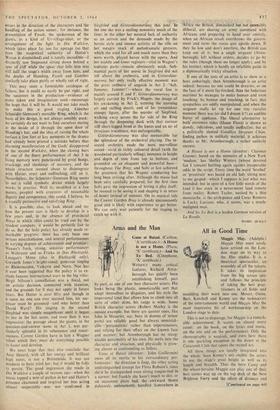Arms and the Man
Guns at Batasi. (Carlton, certificate.)—A House is not a Home. (Plaza, `X' certificate.)—And So To Bed. (Cinephone, certificate.)
WITHOUT many critical fanfares, Richard Atten- borough has quietly been establishing himself, part by part, as one of our best character actors. His looks being the plastic, unnoticeable sort that adapt themselves to disguises. and his style the impersonal kind that allows him to climb into all sorts of other skins, his range is wide. Some British character actors (Robert Morley is the outsize example, but there are quieter ones, like John le Mesurier, say, busy in dozens of minor parts) are reliably good but always unmistak- able--`personalities' rather than impersonators, and relying for their effect on the known face and manner; but Attenborough has no recog- nisable personality of his own. He melts into the character and situation, and physically is grow- ing almost as confounding as Sellers.
Guns at Batasi (director: John Guillermin) owes all its merits to his extraordinary per- formance: the direction is limp, the other acting undistinguished (except for Flora Robson's, since she'd be distinguished even sitting tongue-tied in a corner; but frankly she hasn't much to do), or on occasions plain bad, the awkward theme dubiously. ambivalently, handled. Somewhere in Africa the British, diminished but not ostensibly illiberal, are sharing an army command with Africans and preparing to hand over entirely, when an African revolt overthrows the govern- ment and turns the status quo upside down. If they lie low and don't interfere, the British can keep out of it; but a single sergeant (Atten- borough), left without orders, decides to go by the rules (though these no longer apply), and by his instinct, which is hardly an infallible guide in a diplomatically tricky situation.
If one of the tests of an artist is to show us a bore unboringly, then Attenborough is an artist indeed; because no one could be drearier, or on the face of it more far-fetched, than the ludicrous martinet he manages to make human and even touching. So human and touching, in fact, that sympathies are oddly manipulated, and when the sergeant really let rip for one tiny racialist moment there was (or did I dream it?) an audible flutter of applause. The liberal alternative to both extremist -sides (Dame Flora) is shown as dowdy, ridiculous, and totally ineffective; but as a politically slanted Goodbye Sergeant Chips, finding pathos in unlikely material, it achieves thanks to Mr. Attenborough, a rather unlikely success.
A House is not a Home (director: Clarence Greene), based on the memoirs of a New York `madam,' has Shelley Winters (whose devoted fan I remain) battling again against insuperable odds in the script. Every time the word 'brothel' or 'prostitute' was heard an old lady sitting next to me gasped—which I suppose is just what was intended; but in spite of a few little words of the kind it has stuck in a never-never land remote from reality. Robert Taylor, nastied by a thin moustache, is the arch-ponce and Cesar Romero is Lucky Luciano, who, it seems, was a much- maligned man.
And So To Bed is a leaden German version of La Ronde.
ISABEL QUIGLY














































 Previous page
Previous page